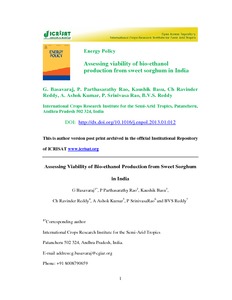Assessing viability of bio-ethanol production from sweet sorghum in India
Abstract
To meet the energy requirement for transport, blending automotive fuels with ethanol has been mandated in India like several other countries across the globe. The entire blending requirement has to come from molasses (by-product of sugarcane). Ethanol produced from molasses will not be able to meet the blending targets due to cyclical nature of sugar cane production resulting in shortage of molasses and its competing uses (potable and pharmaceutical use). This has promoted research efforts to augment energy sources that are sustainable and economically viable. One such source that can be commercially exploited for ethanol production is sweet sorghum. The sugars in the stalks of sweet sorghum can be crushed to produce juice, which can be processed into ethanol for blending. An attempt is made in this paper to assess viability of ethanol production from sweet sorghum. Net Present Value (NPV), the indicator of economic viability assessment, is negative and would thus be difficult for the industry to take off under the current scenario of ethanol price, feedstock price and ethanol recovery rate. Hence, an enabling environment and policy support for bio-ethanol production from sweet sorghum is crucial to meet future blending requirements

